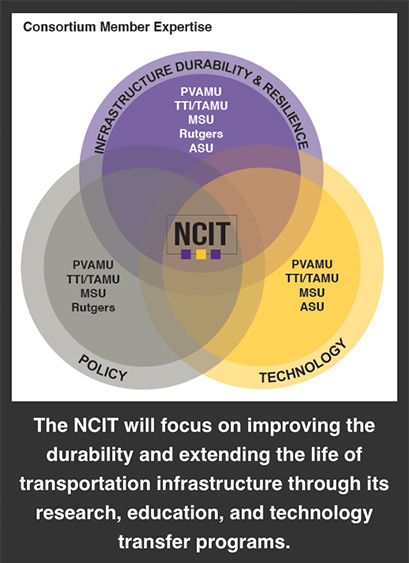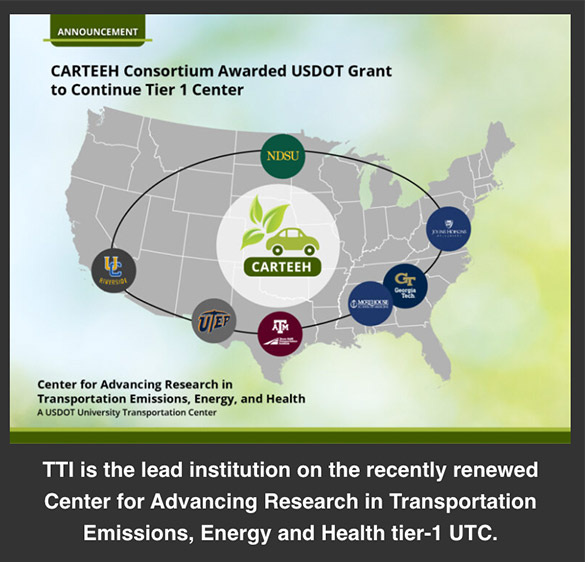
The United States Department of Transportation (USDOT) recently announced grant awards for eight University Transportation Centers (UTCs) in which Prairie View A&M University (PVAMU), the Texas A&M Engineering Experiment Station (TEES), Texas A&M Transportation Institute (TTI) and Texas A&M University will lead or assist over the next five years. Of historical note is PVAMU’s selection to lead the National Center for Infrastructure Transformation, making the institution the first ever Historically Black College or University to lead a national UTC.
“I am delighted that this award has put Prairie View A&M University’s long-held transportation research expertise on the national stage,” says Dr. Judy Perkins, who will serve as center director. “Prairie View A&M University’s leadership, expertise and spirit of innovation will, as the center’s name suggests, work to transform our nation’s infrastructure over the next five years and beyond.”

According to the USDOT, the National Center for Infrastructure Transformation will “develop and transfer into practice new technologies or approaches not currently deployed in the transportation system, including novel data and technology approaches related to artificial intelligence and environmental stewardship and resilience”
The work of the center will aim to improve the durability and resiliency of transportation infrastructure for years to come.
“No one can do it alone. Strategic partnerships are key to advancing research,” says Dr. John E. Hurtado, interim vice chancellor for engineering at Texas A&M and interim director of TEES. “Our teams will develop innovative solutions that will shape this country’s transportation future.”
In addition to serving in consortia on PVAMU’s national UTC, TEES, TTI and Texas A&M will collectively serve as partner institutions on six tier-1 UTCs and one regional UTC, headlined by the renewal of the TTI-led Center for Advancing Research in Transportation Emissions, Energy and Health tier-1 UTC. Research priorities for these seven UTCs will each address one of the following areas:
- improving the durability and extending the life of transportation infrastructure,
- conducting coastal research and education,
- improving the mobility of people and goods,
- preserving the existing transportation system and
- promoting safety.

“Collaboration is at the heart of our success at Texas A&M,” says Dr. Dimitris Lagoudas, senior associate vice chancellor for engineering research at Texas A&M and deputy director of TEES. “We are thrilled to partner with other institutions to conduct cutting-edge research in transportation and drive innovation in this critical field.”
Started in 1988, the UTC program complements the collective research agenda of USDOT’s constituent agencies. The competitive nature of the program evaluates and awards grants based solely on merit. The unique structure of the UTCs encourages universities to partner in consortia, with each emphasizing its best talent as part of the larger community.
“We’ve learned it takes a network of villages to tackle today’s transportation issues, and we’re excited about the breadth of UTC projects our experts will be contributing to,” says Greg Winfree, TTI agency director. “Congratulations to the PVAMU, TEES, TTI and Texas A&M principal investigators who worked so hard on the proposals.”
View the full list of the Texas A&M System-affiliated UTCs and their partners at https://tti.tamu.edu/uncategorized/list-of-affiliated-utcs-for-2022-2026-program/.
